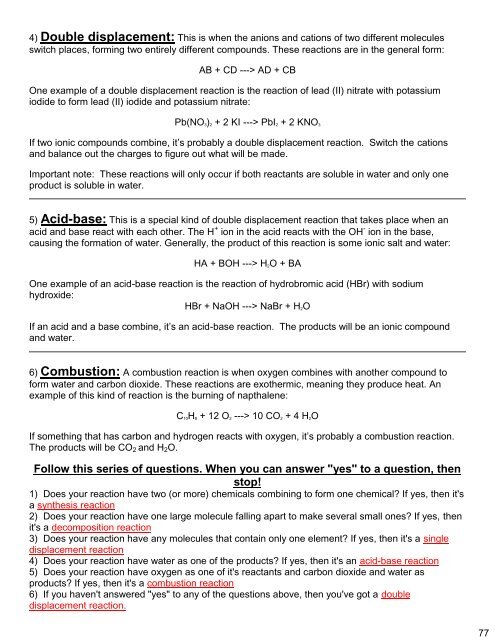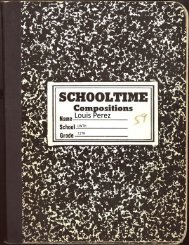You also want an ePaper? Increase the reach of your titles
YUMPU automatically turns print PDFs into web optimized ePapers that Google loves.
4) Double displacement: This is when the anions and cations of two different molecules<br />
switch places, forming two entirely different compounds. These reactions are in the general form:<br />
AB + CD ---> AD + CB<br />
One example of a double displacement reaction is the reaction of lead (II) nitrate with potassium<br />
iodide to form lead (II) iodide and potassium nitrate:<br />
Pb(NO 3) 2 + 2 KI ---> PbI 2 + 2 KNO 3<br />
If two ionic compounds combine, it’s probably a double displacement reaction. Switch the cations<br />
and balance out the charges to figure out what will be made.<br />
Important note: These reactions will only occur if both reactants are soluble in water and only one<br />
product is soluble in water.<br />
5) Acid-base: This is a special kind of double displacement reaction that takes place when an<br />
acid and base react with each other. The H + ion in the acid reacts with the OH - ion in the base,<br />
causing the formation of water. Generally, the product of this reaction is some ionic salt and water:<br />
HA + BOH ---> H 2O + BA<br />
One example of an acid-base reaction is the reaction of hydrobromic acid (HBr) with sodium<br />
hydroxide:<br />
HBr + NaOH ---> NaBr + H 2O<br />
If an acid and a base combine, it’s an acid-base reaction. The products will be an ionic compound<br />
and water.<br />
6) Combustion: A combustion reaction is when oxygen combines with another compound to<br />
form water and carbon dioxide. These reactions are exothermic, meaning they produce heat. An<br />
example of this kind of reaction is the burning of napthalene:<br />
C 10H 8 + 12 O 2 ---> 10 CO 2 + 4 H 2O<br />
If something that has carbon and hydrogen reacts with oxygen, it’s probably a combustion reaction.<br />
The products will be CO 2 and H 2 O.<br />
Follow this series of questions. When you can answer "yes" to a question, then<br />
stop!<br />
1) Does your reaction have two (or more) chemicals combining to form one chemical? If yes, then it's<br />
a synthesis reaction<br />
2) Does your reaction have one large molecule falling apart to make several small ones? If yes, then<br />
it's a decomposition reaction<br />
3) Does your reaction have any molecules that contain only one element? If yes, then it's a single<br />
displacement reaction<br />
4) Does your reaction have water as one of the products? If yes, then it's an acid-base reaction<br />
5) Does your reaction have oxygen as one of it's reactants and carbon dioxide and water as<br />
products? If yes, then it's a combustion reaction<br />
6) If you haven't answered "yes" to any of the questions above, then you've got a double<br />
displacement reaction.




